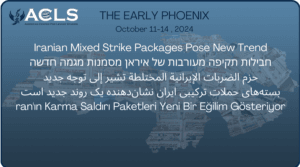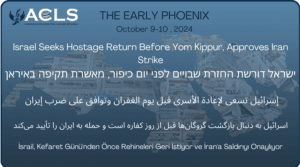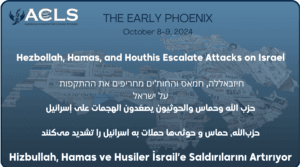October 15, 2024
★ ISRAEL-HEZBOLLAH WAR
Israel Boosts Missile Production, Balances U.S. Support and Independent Strategy
Israel is accelerating missile production to address a critical shortage of interceptor missiles, running production lines around the clock, according to Israel Aerospace Industries CEO Boaz Levy. Israel has spent two decades developing advanced long-range missiles, including Rampage and Rocks, for potential strikes on Iran’s nuclear facilities. These missiles are designed to bypass Iranian air defenses, delivering precise, powerful strikes from F-35 jets. While the U.S. has sent THAAD missile defense systems to support Israel against threats from Hezbollah and Iran, Prime Minister Netanyahu emphasized that Israel’s own missile stockpiles must be replenished. In parallel, Netanyahu confirmed Israel’s commitment to targeting military—not nuclear—sites, following discussions with U.S. officials. Despite agreeing to certain U.S. requests, such as coordinating military actions to avoid interference with the upcoming U.S. elections, Netanyahu remains firm in Israel’s right to strike Hezbollah targets, including in Beirut. He rejected a complete halt to airstrikes in Lebanon’s capital, ensuring that operational decisions remain in Israel’s hands.
Hezbollah’s Naim Qassem: Israel is a Global Threat, Resistance is Legitimate
Hezbollah Deputy Secretary-General Naim Qassem delivered his longest speech to date, declaring that Israel is a “rapist and conquering entity” posing a threat to the region and the world. He defended Hezbollah’s involvement in the conflict, framing it as defensive support for Palestinians and a response to Israel’s expansionist ambitions. Qassem emphasized Hezbollah’s transition from supporting Gaza to direct war with Israel, acknowledging their inability to prevent Israeli forces from entering Lebanon but claiming they are causing significant losses. He reiterated Hezbollah’s right to strike any part of Israel, calling for a ceasefire while maintaining that Hezbollah remains strong despite heavy blows. Addressing the Shiite community and displaced Lebanese, he expressed gratitude for their sacrifices and promised post-war reconstruction. Meanwhile, Lebanon’s caretaker Prime Minister stated that the Lebanese army is ready to deploy up to 11,000 soldiers, if a ceasefire with Israel is reached.
Hezbollah Claims Downing Israeli Drones and Striking Settlements
Hezbollah alleged on Tuesday that their fighters downed two Israeli Hermes-450 drones and launched a series of missile and rocket attacks targeting Israeli military positions and settlements, including Haifa and Kiryat Shmona. According to statements from Hezbollah’s Military Media, the group’s fighters repelled an Israeli advance near Rub Al-Thalatheen and destroyed Israeli military vehicles, including a Merkava tank. The series of strikes, which Hezbollah claims were carried out to defend Lebanon, also included missile barrages aimed at Israeli military bases and artillery positions throughout the day. These claims remain unverified by Israeli sources.
Macron Urges Lebanon Ceasefire, Netanyahu Rejects Reorganization of Hezbollah
During a phone call, French President Emmanuel Macron urged Israeli Prime Minister Benjamin Netanyahu to agree to a unilateral ceasefire in Lebanon. Netanyahu rejected the proposal, insisting Israel would not allow Hezbollah to regroup and rearm, stating that such a ceasefire would return the situation to its previous state.
Israel Intercepts Drone, Continues Strikes in Northern Lebanon
The Israeli army intercepted a drone heading towards its territory from the east. During ongoing operations, Israel also announced the assassination of a Hezbollah official responsible for launching drones into Israel. Hezbollah launched 22 rockets, but no casualties were reported.
Israeli Army Operations Inside Lebanon: Conquest of Ramiyeh
In the latest update from Amit Segal’s Telegram channel, Israeli reservists from the Alexandroni Brigade, stationed at the Alexandroni Air Force Base, have been deployed inside Lebanon. The images shared show the reservists inside the municipality building of Ramiyeh, marking the town as a critical target captured within a single day. Ramiyeh is located approximately 800 meters to 1 kilometer from the border with Israel in southern Lebanon, near the town of Bint Jbeil. This village is strategically significant due to its proximity to the Israel-Lebanon border, making it a focal point during cross-border military operations. It is within the region often associated with Hezbollah activities, and Israeli military operations in this area are part of efforts to neutralize Hezbollah’s influence along the border.
IDF Captures Three Hezbollah Commandos in Southern Lebanon
Israeli forces captured three Hezbollah Radwan Force operatives in southern Lebanon during an operation by the Golani Brigade’s 13th Battalion. The operatives were found in an underground tunnel within a Hezbollah building, along with a large weapons cache and equipment for extended stays. After surrendering, they were arrested and interrogated by Unit 504 before being transferred to Israel for further questioning. Interrogation footage released by the IDF highlighted internal dissension within Hezbollah, as one of the captured members described chaos and abandonment among the ranks.
IDF Clearing Mines Along Golan Heights Border with Syria
Israeli forces have begun clearing landmines and constructing new fortifications along the Golan Heights border with Syria. The operation, which started on October 1, involves pushing the border fence into Syrian territory. The cleared areas are intended to enhance early detection of hostile activity. Syrian troops are reportedly observing without intervening. The mine clearance may indicate Israeli preparations for a ground operation aimed at flanking Hezbollah and disrupting arms transfers between Syria and Lebanon. Russian forces have vacated Golan outposts to avoid potential conflicts with Israeli forces.
50 Rockets Fired at Northern Israel, Two Israelis Injured
The Israeli military reported that 50 rockets were launched at northern Israel, with air defense systems intercepting some. Hezbollah claimed responsibility for a missile barrage targeting Safed, where five rockets struck a home courtyard, injuring two Israelis. Simultaneously, warning sirens sounded across several towns in the Upper Galilee, including Dishon, as Israel’s Home Front Command confirmed widespread alerts. Hezbollah also claimed a rocket strike on an Israeli artillery position in Dalton.
==============
★ Israel – Hamas war
Israel Kills 50 in Gaza as Northern Raid Intensifies
Israeli strikes killed at least 50 Palestinians across Gaza, with 17 killed near Jabalia and 10 in Khan Younis. Airstrikes destroyed homes in Gaza City and Nuseirat camp, killing additional civilians. One doctor was killed, and several medics were wounded during rescue efforts. Updated Casualty Figures in Lebanon and Gaza
The Lebanese Ministry of Health reported 41 dead and 124 injured in Lebanon over the past 24 hours, bringing the total to 2,350 dead and 10,906 injured since the war began. The Palestinian Ministry of Health reported 55 dead and 329 injured in Gaza over the past 24 hours, with total casualties reaching 42,344 dead and 99,013 injured. Additionally, Hamas claims 10,000 more people are missing under the rubble in Gaza.
Israeli Airstrike Burns Palestinian Family Alive in Gaza
An Israeli airstrike targeting tents near Al-Aqsa Martyrs Hospital in Gaza resulted in the deaths of at least four people, including 19-year-old Palestinian student Shaaban Al-Dalu and his mother. The family was sheltering in the hospital compound, which Israel claimed housed a command and control center. The strike ignited their tent, with video footage showing Al-Dalu engulfed in flames while bystanders were helpless. This was the seventh time Israeli forces bombed tents at the site, sparking global outrage over the civilian casualties. Israel defended its actions as part of its broader campaign against Hamas.
Al-Qassam Targets Israeli Forces in Rafah, Al-Quds Brigades Strike in Jabalia
Al-Qassam Brigades detonated an explosive against Israeli forces in Rafah, causing casualties. Al-Quds Brigades targeted a Merkava tank and shelled Israeli soldiers in Jabalia. They also attacked Israeli positions with mortar fire near the civil administration in Jabalia.
US Threatens Israel with Arms Embargo Over Gaza Crisis
The US warned Israel of a possible arms embargo if it doesn’t resolve the worsening humanitarian crisis in Gaza. The White House urged Israel to take action within a month, expressing concern about the situation. Israeli officials Ron Dermer and Yoav Gallant received a letter reminding Israel of its March 2024 commitment to allow the transfer of American humanitarian aid to Gaza. The State Department will audit the aid to ensure compliance with the humanitarian aid law.
UK Sanctions Target Israeli Settler Outposts in West Bank
The UK sanctioned seven Israeli settler outposts and organizations in the West Bank, citing involvement in illegal construction and violence against Palestinian communities. Among the entities sanctioned is AMANA, which the UK claims provides funding and resources for settlers involved in aggressive acts. The sanctions were imposed under Britain’s global human rights regime, aiming to address violations and aggression in the region. Britain’s action highlights its stance on illegal settlements and human rights concerns in the West Bank.
Germany Requests Israel’s Guarantees on Weapon Use
Germany requested guarantees from Israel ensuring that weapons exported from Berlin won’t be used against civilians in Gaza and Lebanon. While there is no formal ban, arms sales have been paused pending Israel’s compliance with international humanitarian law. German courts could halt deliveries if guarantees are not provided. Last year, Germany approved $363.5 million in arms exports to Israel, making this issue significant in current diplomatic negotiations.
Hamas Leadership in Turkiye Orchestrated Tel Aviv Suicide Attack
Israeli authorities revealed that Hamas leadership in Turkiye directed the August 2024 Tel Aviv suicide attack. A joint investigation by the Shin Bet and Tel Aviv Police led to the arrest of eight suspects, with two explosive devices seized. Hamas infrastructure in Nablus coordinated the attack, receiving funding and explosives training from Turkiye. The attack injured a passerby, killed the bomber, and caused property damage.
==============
★ IRAN
The following are critical updates on Iran’s activities from October 11-15, 2024.
Iran and Hezbollah Knew of Oct 7 Plot, Hamas Acted Alone
Documents seized by the IDF show Hamas informed Iran and Hezbollah about the Oct. 7 attack plans in mid-2023. Although Iran and Hezbollah initially supported the operation, they requested more time for preparation. Hamas postponed the assault for a year but ultimately acted alone due to concerns over Israeli defense systems and political developments. Iran denied the documents’ authenticity but publicly praised the attack, organizing celebrations shortly after the incursion.
Putin Calls for New World Order with Iran’s Support
Russian President Vladimir Putin met Iranian Foreign Minister Masoud Bezshkian on Friday October 11 to discuss Iran’s weapon supplies for Russia‘s Ukraine efforts. The meeting, held at an international forum in Ashgabat, also covered Middle Eastern issues. Putin advocated for a “new world order” to strengthen alliances, signaling Russia’s intent to consolidate support amid regional tensions and the Ukraine conflict.
Iran Halts Flights to Europe After EU and U.S. Sanctions
The European Union and the U.S. imposed sanctions on Iran over missile transfers to Russia and other regional activities. Sanctions, approved by EU foreign ministers, targeted seven individuals and entities, including Iran Air, leading Iran to halt flights to Europe to avoid landing restrictions. The U.S. also imposed sanctions on Iran’s oil sector, claiming its energy revenue funds destabilizing activities in West Asia. Tehran denied supplying ballistic missiles to Russia, admitting only to short-range missile transfers. In retaliation, Iran summoned the Hungarian ambassador and paused indirect talks with Washington as tensions escalated. Despite its denials, Iran continues its collaboration with Russia, recently sending two domestically made satellites for launch via Russian spacecraft. These satellites, “Kowsar” and “Hodhod,” reflect the growing cooperation between the two sanctioned nations.
Iranian and French Presidents Discuss Ceasefire Between Hezbollah and Israel
Iranian President Masoud Bezhkishian and French President Emmanuel Macron held talks on securing a ceasefire between Hezbollah and Israel. In their Sunday phone call, they discussed strategies to halt the escalating crisis in southern Lebanon. Bezhkishian emphasized Iran’s commitment to ending conflicts and supporting ceasefire agreements.
Iranian Speaker Flies Own Plane to Beirut, Defies Israel
Iranian Parliament Speaker Mohammad Bagher Ghalibaf flew his own plane to Beirut, signaling defiance as Israeli violence escalates. He landed at Rafic Hariri International Airport on Saturday for a one-day visit before heading to Geneva. The visit follows unprecedented Israeli airstrikes and a ground incursion into southern Lebanon, intensifying the regional conflict. Israeli forces have also targeted Beirut, ignoring international warnings and ongoing UN resolutions. Ghalibaf’s flight and visit underscore Iran’s unwavering support for Lebanon and its resistance against Israeli military actions.
How Deep Are Harris’s Ties to Iran’s U.S. Proxies?
A report from George Washington University’s Program on Extremism exposes Iran’s influence in the U.S., highlighting propaganda, procurement, and covert activities. Entities like the Alavi Foundation have supported religious centers, spreading Tehran’s anti-U.S. sentiment. Imam Mohammad Ali Elahi, head of the Islamic House of Wisdom in Michigan and a former Iranian Navy official, has received nearly $500,000 from Alavi, which has been accused of acting as a front for Iran’s government. Elahi, a vocal supporter of Hezbollah and Ayatollah Khomeini, met Kamala Harris during a 2021 Detroit vaccination event, raising concerns due to his ties with Tehran. His relationships with key Democrats, including John Kerry and Governor Gretchen Whitmer, further complicate the narrative. As Harris runs for president against Trump, questions about Iranian influence in U.S. politics have resurfaced, particularly regarding her foreign policy stance toward the Middle East and her diplomatic engagements.
- Fire at Tehran’s Shadabad Market Linked to Nuclear Component Factories
A fire broke out in Tehran’s Shadabad Iron Market on Saturday, which reportedly involved metal factories producing parts for centrifuges and valves potentially used in Iran’s nuclear industry. According to IntelliTimes, these factories have previously been targeted in sabotage operations, possibly linked to Israel. The Shadabad area has a history of covert sabotage activities, including a reported Israeli operation in 2020 against Atomic Energy Organization of Iran (AEOI) workshops in the same region. Iranian media has confirmed the large fire, though the cause remains under investigation.
- Quds Force Commander Esmail Qaani Appears at Funeral After Weeks in Hiding
Quds Force Commander Esmail Qaani appeared publicly at the funeral of General Abbas Nilforoushan, who was killed alongside Hezbollah’s Hassan Nasrallah in an Israeli airstrike last month. Nilforoushan’s body was recovered after weeks of efforts, and his funeral was held in Tehran on Tuesday. Qaani’s appearance marked his first public sighting since the assassination, following speculation about his fate. Iran’s Foreign Ministry condemned the assassination and vowed to hold Israel accountable, intensifying tensions between Tehran and Tel Aviv.
- Iranian Secret Academy Trains Talented Hackers for Cyber Attacks
“Ravin Academy,” a secret university run by Iran’s Ministry of Intelligence, is located in the heart of Tehran. The academy operates as an executive arm for cyber attack policies under the supervision of Supreme Leader Ali Khamenei. It recruits talented individuals under the guise of training them in cybersecurity. Exclusive information from Iran International reveals intriguing details about the head of one of the regime’s top hacking groups.
- Iran Seeks to Destabilize Jordan’s Government, Raises Concerns in Israel
i24NEWS revealed that Iran is attempting to create alternative forces in Jordan to destabilize the country’s government. Security officials have expressed concern in closed discussions, fearing similar Iranian efforts in other countries, including Egypt. According to military correspondent Yanon Shalom Yathach, both Israel and the U.S. recently detected Iran’s attempts to court opposition groups in Jordan with the aim of overthrowing the ruling regime.
==============
We will provide updates on other countries’ critical events in future editions. Our goal is to equip you with the most urgent and essential information while ensuring that we are closely monitoring and preparing coverage for the rest of the region accordingly. Rest assured, comprehensive updates will follow.



